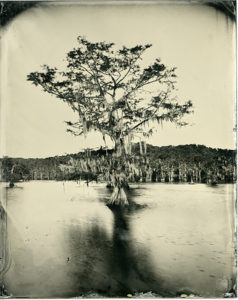
Dr. Bill Nieberding’s Caddo Lake tintype is among the artist’s works featured his exhibition “East Texas: A Portrait in Wet-Plate Collodion” showing Oct. 1 through Nov. 6 at Panola College.
His presentation to the Royal Photographic Society in Great Britain is titled “A Withering Gaze: Technical Excellence and Aura in Contemporary Wet-collodion Photography.” The presentation will take place on Zoom and will explore intersections between the effect of viewing wet-plate collodion photographs and the concept of aura developed by Walter Benjamin in the 1930s.
The exhibition is titled “East Texas: A Portrait in Wet-Plate Collodion” and will be shown in the Allison Gallery in the M.P. Baker Library at Panola College in Carthage. The photographs explore a range of East Texas subjects and still-life works and were created using large-format cameras and the antiquated tintype process invented in the 1850s. The wet-plate photographer must coat the plate with chemicals, expose it in the camera and develop it on location – all before the plate dries out, Nieberding explained.
“It’s a demanding process that produces one-of-a-kind photographs on aluminum or glass,” he said.
Nieberding’s photographic work includes traditional silver-based black and white portraits, landscapes and figure studies as well as digital work that explores notions of social identity in public contexts. Support for the exhibition and the wet-plate collodion research is funded by a Research and Creative Activities Grant through the SFA Office of Research and Sponsored Programs.
The exhibition runs from Oct. 1 through Nov. 6. Gallery hours are 7:30 a.m. to 9 p.m. Monday through Thursday; 7:30 a.m. to12:30 p.m. Friday; and 4 to 9 p.m. Sunday. The gallery is closed on Saturday. It is located at 1109 W. Panola St. Contact the gallery at (903) 693-2052 or visit panola.edu/library/.



